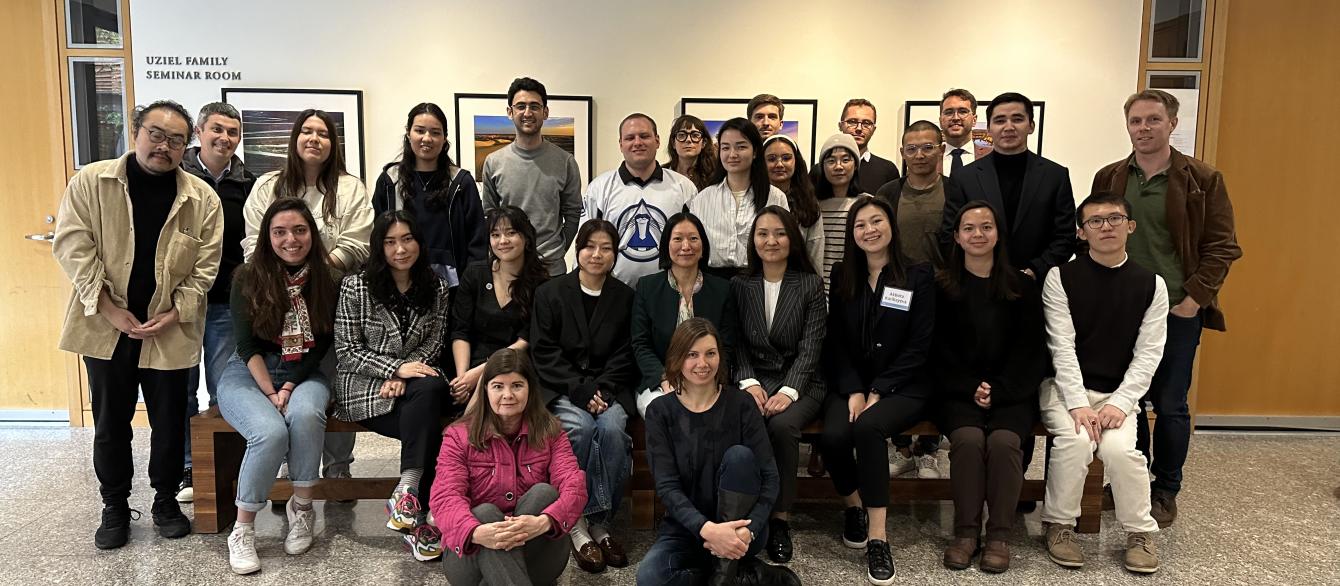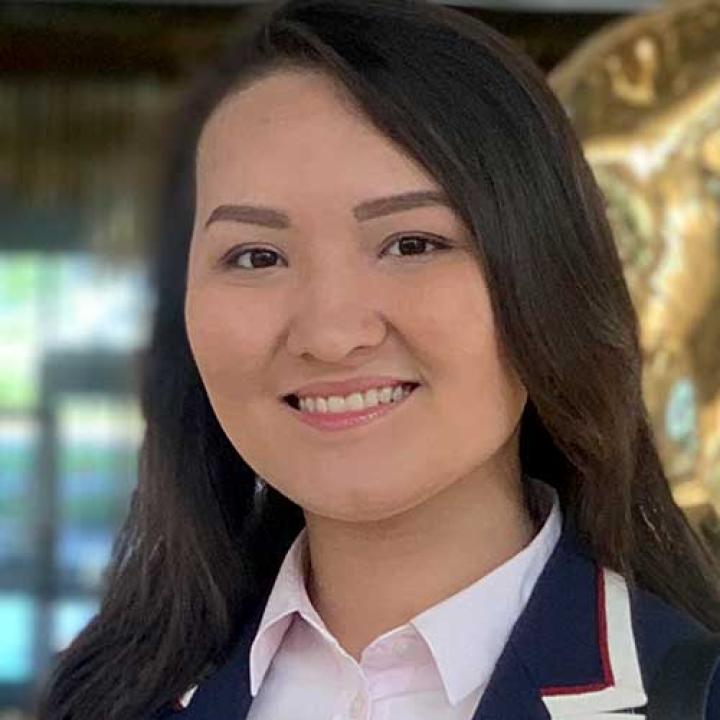The mission of the Davis Center's Program on Central Asia is to promote understanding of the history, culture and current affairs of the five Central Asian countries - Kazakhstan, Kyrgyzstan, Uzbekistan, Tajikistan, and Turkmenistan--at Harvard through researching and teaching. To help fulfill this mission, this year the Program organized a Graduate Student Conference on Central Asia to promote engagement between junior scholars about their cutting-edge research on this dynamic region. On April 22-23, 18 graduate students came to Harvard's Cambridge campus to share their expertise in the region's history, culture, society, and politics and to facilitate fresh and challenging conversations among emerging Central Asia experts.
The first session, “Beliefs and Values: Continuity and Change,” addressed Central Asia’s Soviet past. The session commenced with a presentation by Leora Eisenberg (Harvard University), who examined how the Jewish evacuation to Uzbekistan during the Second World War served as a testing ground for the Soviet ideology of the friendship of the people. Yuliya Ten (Georgetown University) started her presentation by showing a photograph of her great-grandfather standing next to Kim Il Sung. By connecting the personal to the historical, she narrated how Central Asian Koreans played a pivotal role in Soviet foreign policy toward Korea. Kianna Mahony (Harvard Divinity School) analyzed Tajik poetry’s influence on nation-building processes in the region.
The history of nuclear testing in Kazakhstan received separate attention during this session. Maia Simon (MIT) analyzed the Soviet practices of presenting nuclear tests in the Semipalatinsk site as fully controlled, obscuring the vast environmental and human toll. In a similar vein, Dina Aldanova (Georgetown University) drew attention to the humane concerns at the center of the “Nevada-Semipalatinsk” movement. She argued that it was neither an example of top-down nationalist mobilization, nor an expression of internationalism. Muling He (Harvard University) concluded by introducing the Soviet project of “mahallization” which encouraged local institutions to facilitate governance and develop affinities with Soviet identity among Central Asians during the Cold War.
The conference was an exceptional experience that provided a platform to engage in fruitful conversations covering a range of topics about the region. The diverse nature of the presentations enriched my knowledge and expanded my perspectives. I received insightful feedback on my work and made long-lasting connections.
Aidana Razhap kyzy
MA Candidate, Johns Hopkins School of Advanced International Studies
The second session delved into the complex relationships between Central Asia and its two neighboring states, Russia and China, from both historical and contemporary perspectives. Aleksei Rumiantsev (Indiana University) discussed Russia's nationalities policy towards Central Asian communities, while Raushan Zhandayeva (George Washington University) explored the influence of the current war in Ukraine on public opinion and belief formation in Uzbekistan, Kyrgyzstan, and Kazakhstan. John Stanko (Indiana University) presented a novel dataset of Kazakhstani ambassadors since 1992, analyzing the role of the Russian Diplomatic Academy as a soft power tool in Kazakhstan. Przemyslaw Dalek (University of Warsaw) then analyzed China and Russia's priorities in Central Asia, taking into account the changing security landscape of the region.
Shifting temporalities, Zhanara Almazbekova (Georgetown University) and Jonathan Raspe's (Princeton University) presentations examined similar questions in the imperial and Soviet eras. Almazbekova analyzed the works and letters of Kazakh ethnographer Shoqan Valikhanov to gain insight into how he made sense of the Russian imperial colonial project in Central Asia. She concluded that Valikhanov was an active political agent who promoted a cross-cultural brand of social development in his ideas for the future of the Kazakh steppe. Raspe's work, by contrast, focused on the Russification in Soviet Kazakhstan's industrial town of Temirtau. He argued that while local Kazakhs faced subtle discrimination, those who adapted to the predominantly Russian community faced favorable career prospects. Together, these presentations revealed the intricate historical and contemporary relationships between Central Asia and its neighbors.
The final session focused on social, political, and economic transformations in Central Asia. Aidana Razhap Kyzy (Johns Hopkins University) analyzed the relationship between debt, equity market development, and renewable energy consumption in Kazakhstan, and suggested that the country needs stronger capital markets to attract higher levels of investment in renewable energy. Pengshan Pan (University of Pittsburgh) discussed the relationship between foreign mining, labor welfare, and local trust in Kyrgyzstan’s Kumtor gold mine. His study reveals that the Kumtor mine provides social welfare to mine-associated workers while generating grievances among local non-mining residents.
The discussion then shifted from political economy to authoritarian regimes. Akbota Karibayeva (George Washington University) outlined a novel theory on why some autocratic successors denounced their predecessors in the post-Soviet era. Otabek Akromov (University of Minnesota) addressed a related question of authoritarian power transition in post-Karimov Uzbekistan, and argued that political successors pursue deliberate, if partial, political liberalization strategies to increase their public legitimacy.
In the concluding session, Adam Lenton (George Washington University) presented a cross-country study on presidential new year speeches to examine the use of Soviet identity in the post-Soviet age. Examining this issue through the lens of Kazakh political identities, Nazerke Mukhlissova (Yale University) addressed post-independence era identity formation in Kazakhstan by studying the evolution of the country’s “Great Steppe” narrative.
The conference had the privilege of hosting James Pickett, Associate Professor of History at the University of Pittsburgh, who delivered a keynote speech on the relationship between colonialism and public health in the context of Russian imperial rule in the Bukhara emirate, located mostly in the territory of modern-day Uzbekistan, between the Amu Darya and Syr Darya rivers. Wrestling with challenging etiological and historical debates, he explained how the two disease outbreaks in the late 19th century pushed the emirate further into Russia’s “colonial orbit.”
“The keynote address by Dr. James Pickett, once again, made us all think and remember that there were so many fascinating and unexplored questions in our field. His speech on Bukhara, a center of attraction to so many intellectuals at the time, as well as the complex intertwining of history and coloniality, made me reflect on the rich past of the region that has yet to be fully explored and appreciated.’’
Nazerke Mukhlissova
MA Student, Yale University
The diverse and extensive research covered by the participants is a testament to the expanding scope of Central Asian studies and the potential it holds for regional studies. We sincerely hope that the conversations that took place outside of the conference were equally stimulating and fostered lasting connections and friendships. The conference served as a stepping stone for deeper scholarly engagement among graduate students specializing in Central Asia. Although it was the first conference of its kind, we are hopeful that it will become an annual tradition for the Davis Center and for the broader field of Central Asia studies. We look forward to future gatherings that will continue to promote dialogue and collaboration among scholars working in this dynamic field.
Acknowledgements:
This conference was supported by the U.S. Department of Education’s Title VI National Resource Center grant. The content of the conference does not represent the policy of the U.S. Department of Education. We would like to thank the U.S. Department of Education for supporting scholarly research on Central Asia. We would also like to express our gratitude to the Davis Center for Russian and Eurasian Studies staff: Alexandra Vacroux, Eve Blau, Cris Martin, Laura Sargent, Genevieve Wallace, and Yipeng Zhou for making this conference possible.






